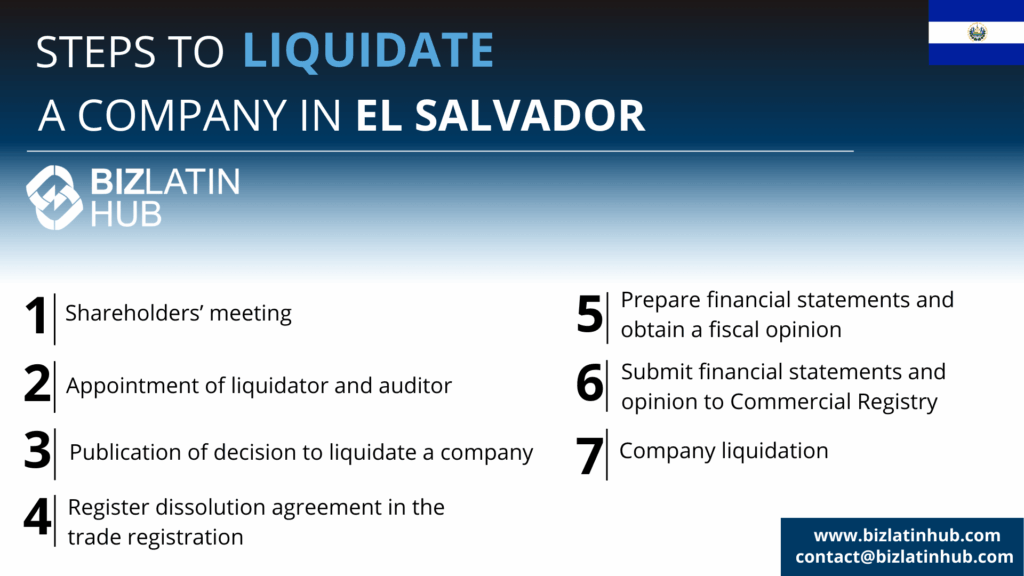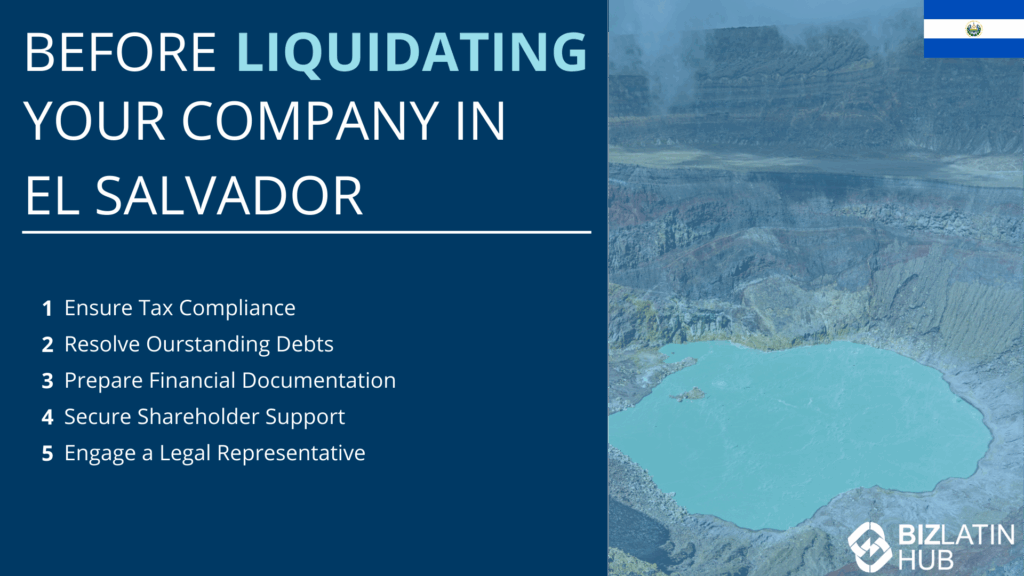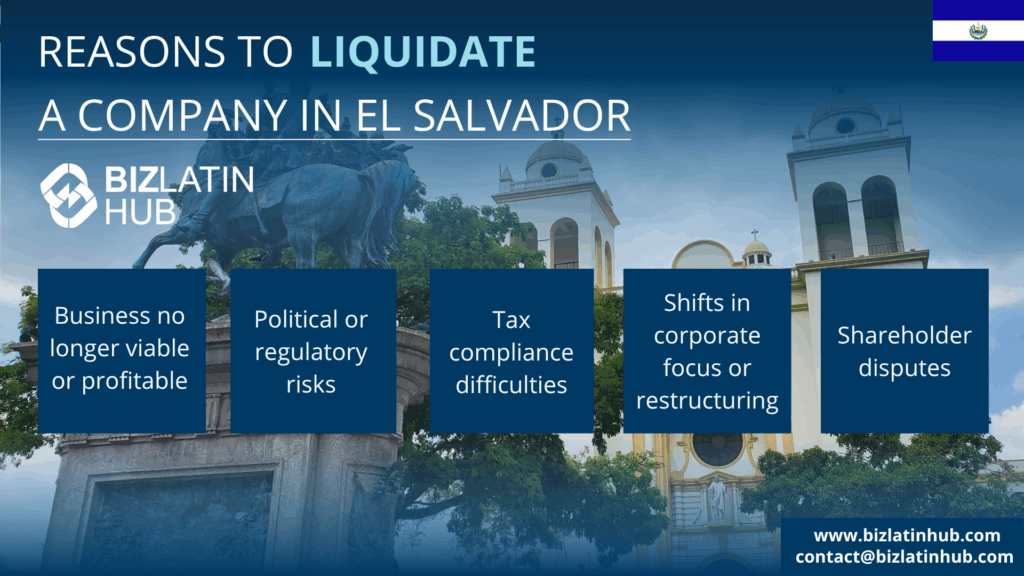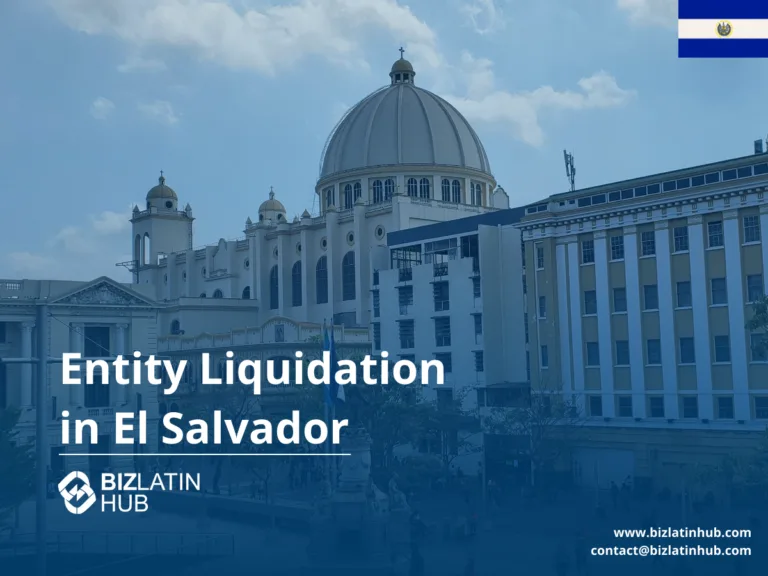Company formation in El Salvador attracts many international investors thanks to its growing economy and pro-business environment. However, if your venture has reached a natural conclusion—whether due to strategic exit, market challenges, or internal restructuring—it’s important to follow the correct legal steps to liquidate a company in El Salvador and avoid future liabilities.
Key takeaways on how to liquidate a company in El Salvador
| Six Legal Steps: | 1. Shareholders’ meeting and resolution 2. Appointment and registration of liquidator 3. Notification to regulatory authorities 4. Asset liquidation and creditor settlement 5. Preparation and approval of final accounts 6. Cancellation and deregistration in official registers |
| Do the shareholders play a role? | A unanimous vote of the shareholders is typically required to begin dissolution. |
| What is the role of a liquidator in El Salvador? | Their duties include finalizing the company’s books, collecting money owed to the company, paying all taxes and creditors, selling company assets, and distributing any surplus to the shareholders. |
| Types of Liquidation: | Voluntary (initiated by shareholders) and Involuntary (court-mandated due to failure to meet obligations). |
| Regulatory Bodies: | National Registry of Commerce, Salvadoran Tax Authority (SIGA), and Legal Notaries. |
| What is the final step? | The final step is cancelling the registration at the Commercial Registry. |
The 3 Phases of the Liquidation Process
There are three distinct phases to the liquidation process, with steps in each phase to be explained in greater detail in the following section.
Expert Tip: The Unanimous Shareholder Vote
From our experience, a critical aspect of initiating a voluntary liquidation in El Salvador is the requirement for a unanimous vote of the shareholders, unless the company’s bylaws explicitly state a different majority. This is a stricter requirement than in many other countries.
We advise clients to review their company bylaws carefully before calling the shareholders’ meeting. If the bylaws are silent on the matter, you must ensure that every single shareholder agrees to the dissolution to proceed. This makes shareholder communication and alignment a crucial first step.
Phase 1: Dissolution (Disolución)
This phase begins with a unanimous resolution by the shareholders to dissolve the company. This decision is formalized in a public deed, which is then registered with the Commercial Registry.
Phase 2: Liquidation (Liquidación)
The appointed liquidator takes administrative control of the company. They conduct a final inventory, pay all employees, creditors, and tax authorities, and prepare a final balance sheet for shareholder approval.
Phase 3: Cancellation (Cancelación)
Once all debts are paid and assets are distributed, and after receiving final clearance from the tax and social security authorities, the liquidator prepares a final public deed. This deed is filed with the Commercial Registry to formally cancel the company’s registration.
6 Steps to liquidate a company in El Salvador
The formal process to liquidate a company in El Salvador involves six key legal and administrative steps, all governed under the Salvadoran Commercial Code and local tax and labor laws. Completing these steps in full compliance is critical to avoid post-closure liabilities, fines, or restrictions on future operations.
Step 1 – Shareholders’ Meeting and Resolution
The process begins with holding an Extraordinary General Meeting of Shareholders to pass a formal resolution for the company’s dissolution. At this meeting:
- A liquidator must be appointed to take responsibility for executing the liquidation.
- A special executor may also be appointed to manage any legal or administrative obligations during the closure.
- The resolution must specify reasons for dissolution, designate the liquidator, and confirm the start of the liquidation process.
Legal Requirement:
The shareholders’ resolution must be notarized and then submitted to the National Registry of Commerce (Registro de Comercio) for official inscription.
Tip:
The liquidator must be either a Salvadoran citizen or a legally authorized local entity with residency and full legal capacity. The earlier the appointment, the faster the downstream filings can proceed.
Step 2 – Appointment and Registration of Liquidator
After appointment, the liquidator must be formally registered with the relevant government bodies.
Steps include:
- Notarize the Letter of Appointment of the liquidator.
- Submit the following to the Registry of Commerce and SIGA (General Tax Directorate):
- Identification documents of the liquidator
- Copy of the notarized shareholder resolution
- Tax clearance certificates from SIGA
- Updated commercial license or patent
- Power of attorney (if needed)
Tip:
This filing must be completed within 30 calendar days from the date of appointment. Late filings may trigger fines or require a new shareholder meeting to revalidate the appointment.
Step 3 – Notification to Regulatory Authorities
Once the liquidator is registered, they must formally notify the following authorities:
- SIGA (Salvadoran Tax Authority) – to begin the tax closure process and verify fiscal compliance.
- Municipal authorities – to cancel local business licenses and resolve municipal taxes.
- Ministry of Labor – to process any worker terminations or severance claims.
- ISSS (Salvadoran Social Security Institute) – to close accounts and confirm employee benefit compliance.
- The notifications must include:
- Certified copy of the dissolution resolution
- Liquidator appointment and ID
- Proof of final payroll or employee termination (if applicable)
Tip:
Keep copies of official filing receipts and acknowledgment letters. These are often requested during the final tax closure and are required to avoid legal presumptions of continued operations.
Step 4 – Asset Liquidation and Creditor Settlement
The liquidator now carries out a full inventory of company assets and liabilities. This includes:
- Fixed assets (e.g. real estate, vehicles, equipment)
- Intangible assets (e.g. intellectual property, licenses)
- Outstanding debts or receivables
- Pending employee severance and tax liabilities
The liquidator must proceed to sell company assets (either via private sale or public auction) and settle debts in the following legal order of priority:
- Employee salaries and benefits (labor claims)
- Tax obligations to SIGA and municipal governments
- Secured creditors (e.g. loans with collateral)
- Unsecured creditors
- Distribution of remaining assets to shareholders
Tip:
Engage a certified public accountant (CPA) to validate all transactions and ensure accurate financial reporting throughout this process. This reduces the risk of future audits or claims of misappropriation.
Step 5 – Preparation and Approval of Final Accounts
After all assets are liquidated and creditors settled, the liquidator must prepare a final balance sheet and liquidation report, which should include:
- A summary of asset sales and fund disbursements
- Bank statements confirming final transactions
- Tax payment confirmations and payroll clearance
- Any surplus or shortfall statements
This report must be:
- Reviewed and approved by shareholders in a final meeting
- Published in the Diario Oficial (Official Gazette) if required by law
- Filed with the Registry of Commerce to officially record the company’s closure
Tip:
Maintain a full ledger and supporting documentation for every payment made. If challenged by tax authorities or former employees, these records are your legal defense.
Step 6 – Cancellation and Deregistration
This final step officially removes the company from all government registries.
Actions include:
- Submit closure documents to SIGA and obtain a Certificate of Cessation of Fiscal Activities
- Cancel registrations with: National Registry of Commerce, Municipal tax authorities, Social Security (ISSS), Ministry of Labor
This step legally extinguishes the company’s existence and ensures there are no lingering tax, labor, or reporting obligations.
Tip:
Retain copies of all deregistration certificates and fiscal cessation letters for at least 5 years. These may be requested during future audits, or if a former employee or creditor files a retroactive claim.

Key Government Bodies
The liquidation process involves several key government bodies. The Commercial Registry (Registro de Comercio) is where the public deeds for dissolution and cancellation are filed. The Tax Administration (Administración Tributaria) must issue a final solvency certificate, and the company must also settle its accounts with the Social Security Institute (ISSS) and the municipal government.
Before liquidating your company in El Salvador
Before beginning the formal liquidation process, take the following preparatory actions:
- Ensure Tax Compliance: Submit all pending tax returns and payments (VAT, income tax, municipal tax).
- Resolve Outstanding Debts: Close accounts payable with vendors, banks, and service providers.
- Prepare Financial Documentation: Inventory assets, reconcile liabilities, and collect legal records.
- Secure Shareholder Support: Obtain official votes and signatures from all shareholders.
- Engage a Legal Representative: Work with a bilingual legal expert familiar with Salvadoran regulations.
Tip: Doing this groundwork helps avoid government rejections and minimizes time delays.

Commercial closure of the company
Once the liquidation deed of the company is registered, the company is officially closed and cannot conduct any further commercial economic activity.
Note that the company may still need to make payments to other government institutions as is required. The previously mentioned entity health check will help identify which final obligations remain for the company.
Some of these final payments include:
- Deregistration at the Fiscal Registry: you will have to appear before the tax authorities to eliminate your fiscal registry so you are disconnected from tax
obligations and payments such as VAT and income. - Closure of municipal account: similar to the Fiscal Registry, you will have to close the company’s activities at the City Hall, and pay any pending municipal taxes if required
- Employer liabilities: You must request from the Salvadoran Social Security Institute (ISSS), proof that the company does not owe any type of salary or benefits to employees at the time of closing the company.
Other considerations for liquidating a company in El Salvador
Types of Liquidation
- Voluntary Liquidation: Shareholder-initiated; used for strategic exits, restructurings, or inactivity.
- Involuntary Liquidation: Court-mandated due to insolvency, labor violations, or failure to comply with tax requirements.
Reasons to Liquidate a Company in El Salvador
- Business no longer viable or profitable
- Political or regulatory risks
- Tax compliance difficulties
- Shifts in corporate focus or restructuring
- Shareholder disputes
Governing Authorities for Liquidation
- Registry of Commerce (Registro de Comercio): Oversees legal filings and changes in company status.
- Salvadoran Tax Authority (SIGA): Ensures all fiscal duties are fulfilled.
- Public Notaries and Labor Ministry: Manage notarization and labor liability reviews.
FAQs for liquidating an entity in El Salvador
Based on our extensive experience these are the common questions we receive from clients about liquidating an entity in El Salvador.
1. What is the process of liquidation in El Salvador?
It includes six key steps: shareholder resolution, liquidator registration, notifying regulators, liquidating assets, final balance sheet, and formal deregistration.
2. How long does it take to liquidate a company?
Generally 6 to 12 months, depending on company size, liabilities, and document preparation.
3. What are the reasons to liquidate?
Reasons include insolvency, exit from market, legal restructuring, or non-compliance risks.
4. Can liquidation be forced?
Yes, by court order or tax authority action if the company has unresolved legal or fiscal obligations.
5. Which government bodies are involved?
Registry of Commerce, SIGA, Municipal offices, Labor Ministry, and ISSS.
6. What are the documentation requirements?
Notarized shareholder agreement
Liquidator appointment and ID
CPA-certified financial statements
Tax and patent cancellation filings
SIGA cessation certificate
7. Is reactivation possible after liquidation?
No. A new legal entity must be formed to resume operations.
8. What is the difference between dissolution and liquidation?
Dissolution is the formal decision by the shareholders to end the company’s legal existence. Liquidation is the subsequent administrative process of winding up the company’s affairs, paying debts, and distributing assets.
9. Who appoints the liquidator?
The liquidator (liquidador) is appointed by the shareholders in the same meeting where the dissolution is approved. It is common to appoint the company’s legal representative or a professional accountant to this role.
10. What are the main duties of the liquidator?
The liquidator becomes the legal representative of the company during the process. Their duties include finalizing the company’s books, collecting money owed to the company, paying all taxes and creditors, selling company assets, and distributing any surplus to the shareholders.
11. How long does the liquidation process take in El Salvador?
The process can be lengthy due to the need to obtain clearances from multiple government agencies. A straightforward liquidation can take from several months up to a year, with the final tax audit often being the longest step.

Biz Latin Hub Can Provide Expert Support for Liquidation in El Salvador
Company formation in El Salvador is straightforward, but exiting the market requires full legal compliance. Our bilingual team helps foreign companies manage every aspect of liquidation—legal, tax, and regulatory.
Contact us today to begin your El Salvador company liquidation.






